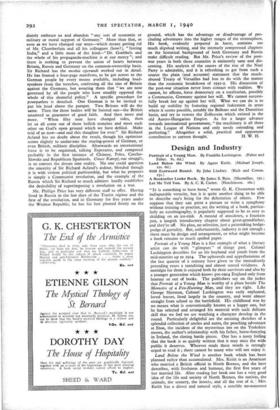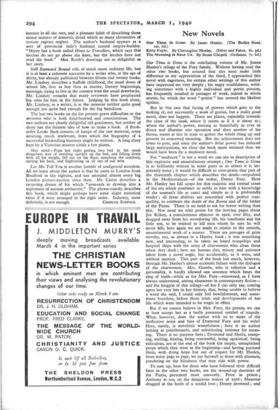Design and Industry
Still Eastward Bound. By John Lindsey. (Rich and Cowan.
I5S.)
" IT is something to have been," wrote G. K. Chesterton with indisputable veracity, but it is quite another thing to be able to describe one's being for the delectation of others. Few suppose that they can paint a picture or write a symphony without training or practice, yet the writing of a book, particu- larly an autobiography, is popularly supposed to be as easy as skidding on an ice-rink. A mound of anecdotes, a fountain pen, a longish introductory chapter about great-grandfather, and they're off. No plan, no selection, just a painstaking hodge- podge of garrulity. But, unfortunately, industry is not enough ; there must be design and arrangement, or what might become a book remains so much spoiled paper.
Portrait of a Young Man is a fine example of what a literary artist can do with " glimpses " of things past. Colonel Lushington describes for us his boyhood and youth from the mid-nineties up to 1914. The upheavals and apprehensions of the last quarter of a century have given to the immediately preceding years a tantalising and almost unreal vividness. A nostalgia for them is enjoyed both by their survivors and also by a younger generation which knows pre-1914 England only from hearsay or out of books. The publishers say on the jacket that Portrait of a Young Man is worthy of a place beside The Memoirs of a Fox-Hunting Man, and they are right. Like George Sherston, Colonel Lushington was early orphaned, loved horses, lived largely in the country, and went almost straight from school to the battlefield. His childhood was by no means what is conventionally known as a happy one, but he has selected and arranged his material with such delicate skill that we feel we are watching a character develop in the round. Particularly delightful are the amusing sketches of a splendid collection of uncles and aunts, the poaching adventure at Eton, the incident of the mysterious inn on the Yorkshire moors, the author's relationship with his father, horse-fancying in Ireland, the closing battle pieces. One has a nasty feeling that the book is so quietly written that it may miss the wide public it deserves. Whoever reads these words is strongly urged to read it ; there cannot be many who will not enjoy it.
Land Below the Wind is another book which has , been planned rather than accumulated. Mrs. Keith is an American who married a British official in North Borneo, and she here describes, with freshness and humour, the first five years of her married life. After reading her book one has a very good idea of the life and society of North Borneo, the natives, the animals, the scenery, the insects, and all the rest of it. ' Mrs. Keith has a direct and natural style, a sensible no-nonsense interest in all she sees, and a pleasant habit of describing those minor matters of domestic detail which so many chroniclers of remote regions neglect. The author's husband appears as a sort of provincial lady's husband turned empire-builder.
" Harry has a book called Hints to Travellers, which says that leeches do not go above the knee, but the leeches have not read the book." Mrs. Keith's drawings are as delightful as her story.
Still Eastward Bound tells of much more ordinary life, but it is at least a coherent narrative by a writer who, at the age of thirty, has already published between fifteen and twenty books.
Mr. Lindsey describes a Suffolk childhood, the usual doses of school life, first as boy then as master, literary beginnings, marriage, trying to live in the country with the usual drawbacks. Mr. Lindsey remarks that many reviewers have prophesied big sales for him in the future. Judging by this book alone, Mr. Lindsey, as a writer, is at the moment neither quite good enough nor quite bad enough for the big battalions.
The last two books on the list present grave difficulties to the reviewer who is both kind-hearted and conscientious. The two authors are clearly delightful old gentlemen, but neither of them has the faintest idea of how to make a book. A Book- seller Looks Back consists of lumps of the raw material, some amusing, much irrelevant, from which the biography of a successful bookselling business might be written. A long diary kept by a Victorian matron yields a few plums.
May 22nd.—Papa last night getting into bed in his usual dangerous way of standing upright on the bed, and falling down with all his weight, fell out on the floor, smashing the crockery, cutting his back, and frightening us all out of our wits
Let Me Tell You is another jumble of undigested anecdote. All we learn about the author is that he came to London from Bradford in the eighties, and has attended almost every big London picture-auction since then. Mr. Carter describes a recurring dream of his which " proceeds to develop into a nightmare of auction arithmetic." The phrase exactly describes this book, which might perhaps have some slight statistical value if it were arranged in the right order. Industry, most















































 Previous page
Previous page